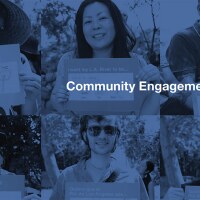Local Media Perspectives on the L.A. River and Northeast L.A.

This past March, the researchers of the Northeast Los Angeles Riverfront Collaborative conducted a focus group discussion with local media producers, editors, and writers. The focus group discussion is part of a larger effort of the Collaborative to understand the media environment in the Northeast Los Angeles area and its role in connecting the River to the surrounding neighborhoods.
More on Northeast Los Angeles
Using the list of local media generated from the media census fieldwork and our online media monitoring work, we reached out to individuals that had been directly involved in producing, editing, or writing media stories about the Los Angeles River and the NELA neighborhoods. The goal of the focus group discussion was to learn about the conditions and challenges of local media storytelling from the perspective of those that were directly involved in creating the stories. More specifically, we wanted to hear about their perceptions about the River and NELA, and their experiences of tapping into information sources, identifying story themes, and creating partnerships with other community organizations and media.
Planning and Conducting a Focus Group Discussion
The focus group discussion was planned and conducted by researchers from USC's Metamorphosis Project. The discussion took about 2 hours and was held on USC campus. Through emails and phone calls, we reached out to and asked individual producers, editors, and writers if they wanted to participate. The final group that participated included one publisher/creative director, two editors, and three writers/reporters. The discussion was moderated by one of the researchers who followed a scripted guide with prepared questions.
Discussion Topics
The discussion was planned around four topics, including: 1) professional and personal relationship to NELA and the L.A. River; 2) pressing issues affecting the area; 3) experiences and challenges of writing, editing, and producing stories; and 4) brainstorming ideas about what an ideal news platform for NELA would look like (See Figure A).

Here is a description of some of the most interesting conversations that emerged:
What's in a Name?
There was much lively discussion at the beginning about the name "Northeast Los Angeles" and "NELA." We were curious if the label was getting around and being used by different people, including local media professionals. Does NELA identify itself as NELA? What role do local media play in this identification?
Based on our discussion, it seems that local organizations and businesses that include this identifier in their names, such as North East Trees or Café NELA, have contributed to "NELA" gaining more recognition over the past two years. It has also taken on a presence on Instagram in the form of hashtags. One participant who is also a longtime resident in NELA commented that the name "Northeast Los Angeles" has a slightly fluid definition and changes through time. With this in mind, there was general agreement of a recent resurgence of "a sense of community" around NELA and the name itself taking on a positive image. And, of course, the participants themselves are important contributors to the NELA identity. In fact, they were invited to the discussion precisely because of their direct references to and diligent focus on "NELA" in their stories.
Relating to the Los Angeles River
The participants were very aware and appreciative of the River's deep historical roots to Los Angeles and that the River has always been a "backdrop" of the City. Other comments were made about the River's connections to its surrounding neighborhoods, the people who live along the River, and also the surprising amount of wildlife down there.
Writing about the River
By writing about the river, the local media "connect with the community." It lets them take part in the "positive energy" that is building around the River, to reflect on the "possibilities of the city", and, on a more practical level, to share information about what is going on in the area.
Informing NELA residents about the River
We brainstormed lists of the most pressing issues affecting the River and NELA neighborhoods. The local media participants identified information about the River that they thought residents would find most useful:
- Updates on future plans/projects in housing, development, bike lanes
- Points of interest (neighborhood meet & greet places)
- Events (family-friendly, arts-related, recreational)
- Safety/pollution
Challenges of Local Media Storytelling
One of the challenges that were voiced throughout the discussion was to not always take the "easy way of doing it" (by going back to the same sources) and to be able to allot equal amounts of attention to different groups in the community in their stories. The challenge of keeping people updated on events and information related to the River, especially as they relate to important decisions being made in the community, was also mentioned.
Why Local Media?
There was a shared sense of pride about the kind of relationships the local media were establishing with the residents and other players in the community. As one participant explained, there is a sense of "intimacy" and "urgency" in the types of stories they write. What makes these local media different from other city-wide or nationally-focused media outlets is that each of the editors, producers, and writers have vested interest in the community. They take pride in their grounded approach to getting to know the individuals that make up the community, and, ultimately, gaining their trust.
Lessons Learned
First, the focus group discussion in and of itself was a meaningful opportunity for local media to come together, see the real people behind the media, share information, and interact with each other. Second, there is no doubt that local media play an important role as community storytellers. They provide information to residents, bring attention to community issues that might otherwise go unnoticed, and enhance outreach efforts of community organizations. Through collaboration with other media, community organizations and residents, they can help build an agenda of issue priorities for the community.

